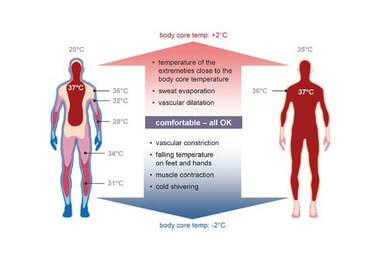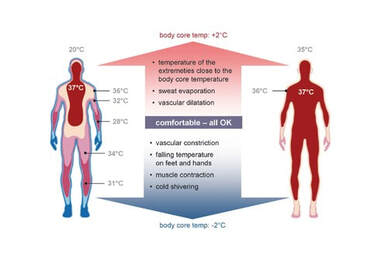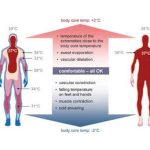When you’re stuck in the sweltering heat of summer, sweating is probably the last thing on your mind as you seek relief from the sun’s scorching rays. But what if I told you that sweat is actually a superhero, working tirelessly behind the scenes to keep your body temperature just right?
Meet Your Body Temperature Hero: Sweat
Sweat might not be the most glamorous topic, but it’s crucial for our survival. Without it, our bodies would quickly overheat, leading to serious health consequences. In this post, we’ll delve into how perspiration allows humans to maintain their body temperature, and why it matters.
The Importance of Body Temperature Regulation
When your body temperature rises above its optimal range (around 98.6°F or 37°C), your internal organs begin to suffer. Enzymes slow down, proteins denature, and even your brain function can be impaired. In extreme cases, hyperthermia (heatstroke) can occur, with potentially life-threatening consequences.
This is where sweat comes in – an essential mechanism for thermoregulation that has evolved over millions of years. So, how exactly does it work? Let’s explore the first crucial step…
The Cooling Process: Evaporation
Sweat production is just the beginning; evaporation is what makes it a game-changer. As sweat drips onto your skin, it quickly evaporates into the surrounding air, taking heat away from your body in the process.
In our next section, we’ll dive deeper into the science behind evaporation and how it’s the key to maintaining a stable body temperature…

In our previous section, we explored how sweat production is just the beginning of the cooling process. Now, let’s dive deeper into the science behind evaporation and how it’s the key to maintaining a stable body temperature.
The Magic of Evaporation
Evaporation is a crucial step in the thermoregulation process because it allows your body to release heat quickly and efficiently. When sweat evaporates, it takes approximately 0.578 calories per milligram with it, which is equivalent to about 0.24 kilojoules per gram.
This may seem like a small amount, but when you consider that the human body can produce up to 1 liter of sweat per day, it’s clear that evaporation plays a significant role in maintaining your body temperature.
The Role of Humidity and Air Movement
But what happens when the air is hot and humid? Or when there’s little to no air movement? In these situations, evaporation slows down or even comes to a standstill, making it harder for your body to cool down.
This is where your body’s thermostat kicks in, increasing sweat production to compensate for the reduced evaporation rate. So, while humidity and air movement can affect the efficiency of evaporation, they don’t render the process useless.
The Importance of Thermoregulation
Thermoregulation is a vital function that allows your body to maintain its internal temperature, regardless of the external environment. Without it, you’d be susceptible to heat-related illnesses, such as heat exhaustion or heatstroke, which can have serious consequences.
As we continue to explore the wonders of thermoregulation and sweat, let’s keep in mind that this process is not unique to humans. Many animals, from dogs to elephants, use similar mechanisms to regulate their body temperature and maintain overall health.
In our next section, we’ll delve into the role of other factors that influence your body’s ability to cool down, such as physical activity and clothing choices…
Consult a Medical Expert Now
Learn more about how perspiration helps humans maintain their body temperature and get personalized answers to your health-related questions.
Start chatIn our previous sections, we’ve explored the importance of regulating body temperature and how sweat plays a crucial role in thermoregulation. Let’s summarize the key points covered so far:
Key Takeaways
- Sweat is an essential mechanism for maintaining body temperature.
- The optimal body temperature range is around 98.6°F (37°C).
- Rising body temperatures can lead to serious health consequences, including hyperthermia (heatstroke).
- Evaporation of sweat is the key process that cools the body and maintains a stable temperature.
Now that we’ve covered the science behind perspiration, let’s take a step back and appreciate the incredible importance of this process. Sweat might seem like a small, insignificant thing, but it’s actually a vital component of our survival mechanism. Without it, our bodies would quickly become overwhelmed by heat, leading to serious health consequences.
The Final Verdict: Sweat is Your Body Temperature Superhero
So the next time you find yourself sweating in the middle of a hot summer day, remember that your body is working tirelessly behind the scenes to keep its temperature just right. Sweat might not be the most glamorous topic, but it’s truly a superhero worthy of recognition and appreciation.
And there you have it – a brief explanation of how perspiration allows humans to maintain their body temperature. It’s a process that’s been refined over millions of years, and it’s one that we can all learn to appreciate and respect.
Specific Gravity Urine: 1.020: Ever wondered what specific gravity in urinalysis means? Find out how this test can help diagnose kidney problems, dehydration, or other underlying conditions. Read on to learn more about the significance of a 1.020 specific gravity reading.
What is Anemia Caused by Folic Acid Deficiency?: Are you experiencing fatigue, pale skin, or shortness of breath? You may be suffering from anemia caused by folic acid deficiency. Learn how this type of anemia occurs and what lifestyle changes can help alleviate its symptoms.




